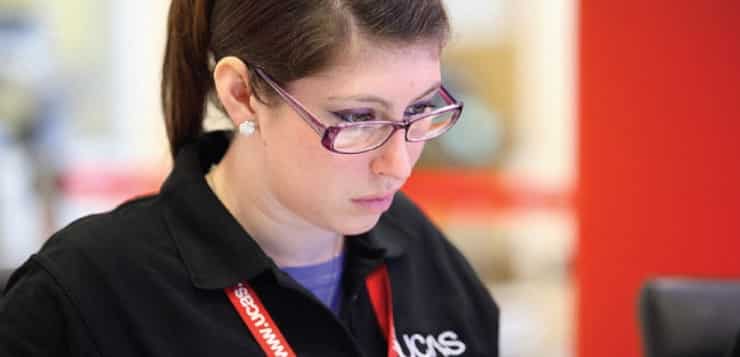Each year, around 2,300 Canadian students apply to a UK university or college through UCAS, the centralised admissions system for over 350 institutions.
Students wanting to study a full-time undergraduate degree in the UK don’t contact each institution they’re interested in directly or individually. Instead, UCAS (Universities and Colleges Admissions Service) provides a central service, with the ability for each person to apply to up to five different study programmes, referred to as ‘courses’ in the UK.
Each year, over 1,100 Canadian students are accepted and take up their course after applying through UCAS. The most popular courses for Canadian students to apply for are law, medicine, and business studies. In total, UCAS processes over 2.5 million applications every year from 700,000 people, placing around 500,000 people from around the world in some 350 UK higher education institutions.
UCAS is a strong advocate of making UK higher education more accessible internationally, and works closely with organisations like the British Council to support the recruitment of students from around the world. This means there’s already a broad range of advice on offer to international students. The UCAS website has a dedicated International section where students, tutors, advisers, agents, and parents can find out more about studying in the UK: www.ucas.com/international
UK qualifications are respected the world over, with all courses meeting strict academic criteria. The Quality Assurance Agency (QAA), assesses the quality of each university or college’s teaching standards, so students can make choices with confidence.
The UK has some of the oldest and most respected universities in the world. Many of the world’s most influential leaders, businessmen and women, and academics have walked the halls of UK institutions.
The application process
In simple terms, applying to university in the UK is a three-step process:
- Choose your course
- Apply online at ucas.com
- Make arrangements to study
Choose wisely
Wherever you decide to study, it’s important to do as much research as possible. If you can visit the UK before applying, you should consider attending some university open days – UCAS regularly updates a list of these online: www.ucas.com/open-days-dates. UCAS’ international team attend numerous overseas education conventions; take a look to see if they’re coming to an event near you: www.ucas.com/international-events
Once you have an idea of what and where you’d like to study, you’ll find a wealth of additional information on the UK’s 37,000 higher education courses in the UCAS search tool – search.ucas.com. Here you have the opportunity to explore the subjects that interest you in more depth, find out entry requirements, student statistics, and specific course details.
Online application
As an international student you apply for courses in exactly the same way as UK (and EU) students do. The admissions cycle begins each September, a calendar year before you begin your undergraduate studies. All applications are submitted online using UCAS’ Apply portal: www.ucas.com/apply
When completing your application, you should give as much detail as possible about your qualifications. While the majority of universities will have an understanding of the most popular qualifications, it’s often worth explaining more about the specific subjects you’ve studied and how they relate to what you are applying for. Universities and colleges you apply to may also ask you to send copies of your qualification certificates to – take a look at UCAS’ international application advice for more guidance: www.ucas.com/how-it-all-works/international/how-apply/how-comple…
You also need to be aware of the three application submission deadlines. The key deadline date for the majority of undergraduate courses is 15 January; but there are two other deadlines to keep in mind:
- 15 October – for applications to the universities of Oxford and Cambridge, or to any medicine, dentistry, or veterinary medicine/science course
- 24 March – for some art and design courses (check with individual institutions for clarification)
However, if you’re applying for performance arts subjects at one of the UK’s conservatoires, you’ll need to use the CUKAS admissions service – a dedicated performing arts admissions portal that’s also run by UCAS. Take a look at www.ucas.com/how-it-all-works/performing-arts for more information.
One of the most important and time-consuming parts of the application is the personal statement. It’s the only opportunity you’ll get to explain to your chosen universities exactly why you’re a great fit for the courses you’re applying to, and to demonstrate how committed you are to your chosen subject. You can only submit one personal statement so it’s important to take the time to write this carefully. Check out www.ucas.com/personalstatement for more advice.
The final part of the UCAS application is securing a reference to support your application. Most students elect their teachers or advisers to provide these. If your first language isn’t English, those supplying references for you should comment on your language ability, and indicate if any classes you attended were taught in English.
The majority of UK universities and colleges require students to demonstrate good English language skills. This can be evidenced in a number of different ways. If English isn’t your mother tongue, check with individual institutions to find out what you need to do.
After you’ve sent off your application you can see how it’s progressing by logging in to UCAS’ Track system – track.ucas.com (which is essentially an extension of Apply). Through Track, you can see when decisions are received from each of your chosen universities and colleges. If you don’t receive any offers, or decline the offers you do receive, you may be able to apply for an additional course through a scheme called Extra – www.ucas.com/extra. Extra, which runs from the end of February and early July each year, enables you to apply for any course that still has vacancies.
When each university or college has received and considered your application, they will make their decisions. If they make an offer it may be either ‘Unconditional’ or ‘Conditional.’
- Conditional: a place is reserved for you, subject to entry requirements being met (usually academic conditions)
- Unconditional: a place is guaranteed, as you’ve met all entry requirements
The majority of offers made are ‘Conditional’ and, more often than not, are dependent on the results you get in your summer exams. Most universities reference entry requirements for each course in their prospectuses and on their websites. You’ll also find this information when researching courses via the UCAS search tool.
Making arrangements
Students from Canada (as with all students from outside of the EU) will need a student (Tier 4) visa to study in the UK. While UCAS doesn’t arrange visas, there’s lots of advice on the Immigration and visas section of the UCAS website: www.ucas.com/undergraduate/after-you-apply/student-visas-immigra….
In order to qualify for a Tier 4 visa, you will need to prove that you can pay for your first full year of tuition fees, and support yourself through the first part of your studies. Luckily, there are lots of different financial aid options on offer to international students – loans, bursaries, and scholarships.
Tuition fees at UK universities are split into two categories: Home/EU, and international. Home and EU students can pay up to £9,000 per year, but non-EU students often pay more. You can find out exactly how much tuition will cost when researching different courses using the UCAS search tool. Many universities and colleges list any available scholarships and bursaries under the ‘Fees and Finances’ tab.
If you’re thinking of studying for a medical qualification, you may able to get funding from the UK National Health Service. There’s more information on the NHS Bursaries website: www.gov.uk/nhs-bursaries/overview. If not, take a look at your chosen universities’ websites for more details. It’s also worth reading the financial section of the UCAS website: www.ucas.com/undergraduate/student-life/getting-student-support/….
Additional useful websites include:
The UK Council for International Student Affairs (UKCISA): www.ukcisa.org.uk/International-Students/Fees–finance/Home-or-Overseas-fees
British Council’s Education UK scholarship and financial support advice – www.educationuk.org/global/articles/scholarships-financial-suppo…
Contributed by:
UCAS – Universities and Colleges Admissions Service
www.ucas.com







